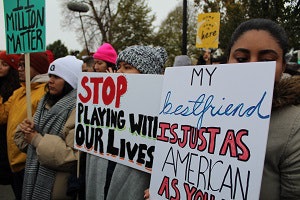Josefina Espino, a program specialist at the DREAMer Resource Office at California State University San Marcos, saw one of her team members in tears. Counselors at the office had been helping undocumented students prepare their first applications for DACA, the Deferred Action for Childhood Arrivals program, which protects people who came to the U.S. as children from deportation. Then the Trump administration released new restrictions to the DACA program.
On July 28, acting homeland security secretary, Chad Wolf, announced in a memo that all new applications for DACA would be rejected, and pending applications would be assessed on a case-by-case basis. Also, instead of allowing DACA recipients to renew their status every two years, they would now need to renew annually. Advance parole will only be granted in “exceptional circumstances.”
Amid a review, “I have concluded that the DACA policy, at a minimum, presents serious policy concerns that may warrant its full rescission,” Wolf wrote. “At the same time, I have concluded that fully rescinding the policy would be a significant administration decision that warrants additional careful consideration.”
These restrictions come on the heels of a U.S. Supreme Court decision in June that blocked the Trump administration’s 2017 bid to end the Obama-era program, a moment of relief for DACA recipients and their advocates.
Now, the new changes are eliciting a mix of reactions among Espino’s students. While some remain “hopeful” for the program, undocumented students prepping their DACA materials were “devastated,” as were the staff members who work with them.
“It’s just hard,” she said. “Because you do have those people in mind that you were so excited for. They’re applying, they’re gathering all of their documentation, they’re getting ready to submit – and then they can’t.”
Meanwhile, her team is trying to guide DACA and undocumented students through a shifting legal landscape, all amid COVID-19. The office offers legal services and workshops on immigrant rights, but some students haven’t been able to make it because of internet connectivity problems. They’re also overwhelmed by emails from the university, she said, as the fall semester approaches.
It’s a “very weird” and unsettling moment for DACA students to be disconnected from their campus supports, said Dr. Marisol Clark-Ibáñez, a sociologist at California State University San Marcos. That’s why she wants to see colleges and universities put resources into office like Espino’s as restrictions to the DACA program unfold.
“The research tells us time and time again that these students need a one-stop shop” for resources, Clark-Ibáñez said. Otherwise, “we still have students not getting answers they need or facing staff who are totally overworked … All of our states are going through an economic downward spiral because of COVID. So, this is the time not to say we need to pull back resources, but this is actually the time to look at who are the most vulnerable populations and redeploy resources to support those students.”
She also thinks it’s important for campuses to make resources, like legal services, available to DACA students’ families. In this tumultuous time for DACA students, higher education leaders are worried about retaining them, she said, and the wellbeing of their families is a major factor in keeping them enrolled. Many come from mixed status households and – between undocumented family, the continued precariousness of their DACA status and the pandemic – they carry a lot of worry into their academic work.
She wants to see universities embrace a new model where students’ loved ones are “part of the equation.”
“When a student sits in your classroom, they’re sitting there with their mom on their shoulder, their little sister on their lap. They’re coming with everybody,” she said. “We’re all concerned about graduation rates and how students do, but we’re very short-sighted in thinking students just end at their student ID numbers.”
This is especially true with the latest set of restrictions to the DACA program, pointed out Dr. Carolina Valdivia, a UC President’s Postdoctoral Fellow of sociology at the University of California, Los Angeles. Now, there are families where some siblings have DACA status and others can no longer apply, she said, which can cause tensions. It also puts pressure on DACA recipients because they might be the only family members who can legally work and support the household. Plus, each DACA renewal costs $495, which now only buys one year of protection.
In addition to legal services and financial support for DACA students and their families, Valdivia wants to see campuses offer mental health services with counselors educated in the DACA and undocumented student experience.
“All of this is definitely taking a toll on their mental health, exacerbated with this more recent news that came out, following what seemed like an initial victory at the time with the Supreme Court ruling,” she said. Now DACA students again find themselves in a moment of “heightened vulnerability.”
Sara Weissman can be reached at [email protected].



















